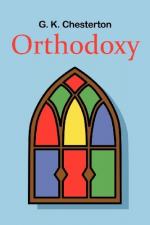
|
| Name: _________________________ | Period: ___________________ |
This test consists of 15 multiple choice questions and 5 short answer questions.
Multiple Choice Questions
1. What problem did Christianity solve which Paganism could not?
(a) Balance.
(b) A personal God.
(c) Salvation.
(d) Forgiveness.
2. What people, in their interactions with women, does Chesterton call stupid?
(a) Those who take women for granted.
(b) Those who abuse a woman's loyalty by constantly testing it.
(c) Those who think women's loyalty stems from blindness to a man's fault.
(d) Those who think women's loyalty is a fault.
3. Why does Chesterton call suicide the greatest sin?
(a) Because it cuts off the future.
(b) Because, in the eyes of one man, it kills the whole world.
(c) Because man is acting like God.
(d) Because it takes a life God had given.
4. Why does Chesterton say that a man is bewildered when asked to summarize his belief in something?
(a) If he has only scattered evidence for that belief.
(b) If he must defend it to people who oppose him.
(c) If he has no evidence for his belief other than his desire to believe.
(d) If everything he knows supports that belief.
5. Why did a typical nineteenth-century man not believe in Christ's resurrection, according to Chesterton?
(a) His scientific mind told him it was impossible.
(b) His liberal Christianity did not allow it.
(c) He didn't want to acknowledge Christ's divinity.
(d) His materialism did not allow it.
6. Why does Chesterton call courage a contradiction?
(a) Only the meek person can show courage.
(b) The person most wanting to live is the person willing to die.
(c) It has no meaning in everyday life.
(d) It can only be proven in life-threatening circumstances.
7. Chesterton names four standards by which people try to establish the ideals of equality and inequality. What is his opinion of the fourth standard?
(a) It is the only sensible one.
(b) Its roots are in paganism.
(c) It is ridiculous.
(d) It is the only one fitting to Christianity.
8. What is Pimlico?
(a) A dreary American town.
(b) Chesterton's favorite dog.
(c) An English newspaper.
(d) A dreary English town.
9. According to Chesterton, what is the problem with moving slowly toward justice?
(a) People cannot make just decisions in a large amount of time.
(b) It does not allow a man to move swiftly toward a better state of things.
(c) The definition of justice changes too often in that time.
(d) A man will only be able to act on old ideas.
10. What is the single true charge that Chesterton found against Christianity?
(a) Christianity cannot be compatible with science.
(b) Christianity is one religion.
(c) Christianity's claim to the Trinity is false.
(d) Christianity's view of salvation is unnecessarily complex.
11. How has western religion interacted with the idea of social organisms?
(a) Western religion says that the family unit is the only important social organism.
(b) Western religion says that no person should be alone.
(c) Western religion says that the church provides the only stable society.
(d) Western religion says that social organisms are harmful to faith.
12. According to Chesterton, what happens when a man worships physical nature?
(a) Nature becomes twisted.
(b) Man can only then begin to search for God.
(c) Nature becomes pure as it offers salvation.
(d) Man is lifted up to God.
13. How does Bernard Shaw speak of miracles?
(a) With admiration.
(b) With disbelief.
(c) With awe.
(d) With contempt.
14. What is Chesterton's third criterion for progress?
(a) It must be like Eden.
(b) It must be earthly.
(c) It must be heavenly.
(d) It must be a utopia.
15. What moment does Chesterton point to as the single instant when God appeared to be atheist?
(a) When Christ was abandoned on the cross.
(b) When the first person, Abel, was murdered.
(c) When Eve fell into sin.
(d) When he had to send the Flood to wipe out most of humanity.
Short Answer Questions
1. Chesterton notes a startling difference between Christian and Buddhist art. What is this difference?
2. What was Chesterton's early progression through religious mindsets?
3. What does Chesterton define as the problem with pessimists?
4. In the Christian's view, why does a man's soul provide enough outlet for both the optimist and the pessimist?
5. How does the Christian idea of a transcendent God manifest itself in a frightening way?
|
This section contains 795 words (approx. 3 pages at 300 words per page) |

|




